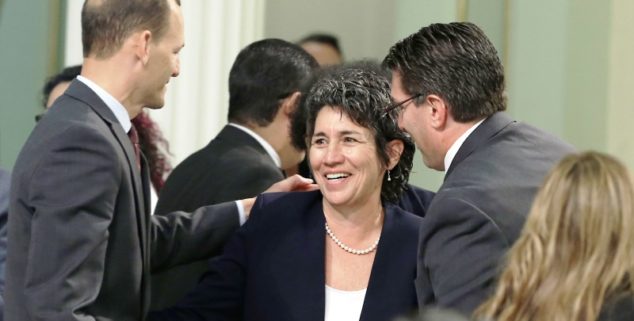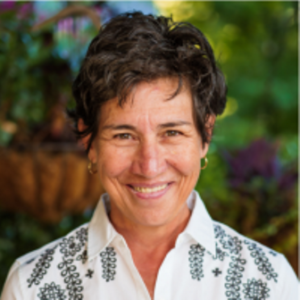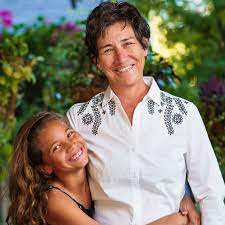News
Capitol Weekly Interview: Susan Talamantes Eggman
 Susan Talamantes Eggman is congratulated in the Assembly following passage of her right-to-die measure. (Photo: AP/Rich Pedroncelli)
Susan Talamantes Eggman is congratulated in the Assembly following passage of her right-to-die measure. (Photo: AP/Rich Pedroncelli)Susan Talamantes Eggman was raised in Turlock, where her family owned a small almond orchard and apiary (bee-keeping), and her first job that wasn’t on the family farm started her on a path to working in health care and mental health throughout her life.
Toward the end of her senior year at Turlock High School, in 1979, she got a job at a psychiatric facility, Crestwood Manor, where her title was “milieu manager,” a fancy way of saying she tried to keep the severely mentally ill patients safe, mediate disputes, help them with daily tasks and medication.
“There were fights, and falls, and people could still smoke,” she recalled in an Aug. 26 interview with Capitol Weekly. “We would go outside, and I was the lighter of people’s cigarettes.” And she remembers “very clearly, the first time I was laid out in the hallway during [dispensing of] meds.”
A male patient “punched me right in the stomach so hard that it knocked the wind out of me, put me on the floor. I remember being surrounded by people looking down on me. That’s something you don’t forget.”
She worked at Crestwood for about six months, graduated from high school and, at 18, from a family of veterans, joined the U.S. Army as a medic. After four years in the Army, she returned to Turlock and completed a Bachelor’s degree in Psychology and a Master’s in Social Work at California State University, Stanislaus, later earning a PhD in Social Work at Portland State University.

State Sen. Susan Eggman.
She started her PhD program in 1997, when Oregon’s ground-breaking end-of-life law — known as the Death with Dignity Act — had just taken effect, and she worked as a medical social worker with patients in hospice care at the University of Oregon Hospital (now Oregon Health and Science University, a trauma center and teaching hospital).
Her mother, who was Latina, served as Eggman’s research assistant for her doctoral dissertation, and they traveled throughout the Valley, interviewing families for a research project on the challenges of end-of-life care for Latinos.
Long-shot run for City Council
A licensed clinical social worker (LCSW) with long experience in medical social work in myriad settings — from hospitals and hospices to locked psychiatric facilities, jails and addiction treatment centers – Eggman, now 60, was a Social Work professor at California State University, Sacramento, when she decided to run for the Stockton City Council in 2006. It was a long shot, and her surprise upset victory made her the first Latina and the first lesbian ever elected to the council.
During the campaign, she regularly confronted rank homophobia. The opposing candidate referred to herself as “God’s candidate,” and introduced her “soul mate” husband at campaign events. In one televised debate organized by the NAACP, Eggman turned pointedly away from the camera and addressed her opponent directly: “Injustice is injustice, no matter how you wrap it up.”
It was typically direct, no-frills Eggman, cutting through the political noise to expose the core of the issue.
She was an unlikely politician – a social worker and teacher with a passion for community organizing — but has rapidly risen in local and state government, earning a reputation for successfully working across the aisle to pass, often unanimously, some of the most significant mental health legislation in decades.

State Sen. Susan Eggman, D-Stockton, at a Capitol committee hearing.
In 2012, she made a similar grassroots run for the state Assembly, was easily re-elected and last year won a state Senate seat representing San Joaquin County, a wide swath of Stanislaus County and Galt in Sacramento County. She has successfully shepherded multiple, complex mental-health bills into law, including a major Assembly measure last year, AB 1976, which significantly strengthened “Laura’s Law” to give families one of the few legal avenues to get seriously mentally ill relatives into treatment.
Passed nearly two decades ago, Laura’s Law (Assisted Outpatient Treatment, or AOT) has been successfully implemented in many California counties — reducing hospitalizations, incarceration, homelessness and saving public funds. But it was not made permanent until Eggman’s legislation, nor did it require counties to hold public hearings and explain why they did not have such programs, as AB 1976 did. It was passed unanimously last year, and has since been adopted in 30 of California’s 58 counties, including all of the larger ones.
Eggman introduced six mental-health reform measures in the Legislature this year. Two of the most significant bills were unanimously approved and sent to the governor before the Legislature adjourned on Sept. 10, and one was extended into next year:
–SB 507, further expanding Laura’s Law, passed unanimously and sent to the governor.
—SB 316, enabling clinicians to bill Medi-Cal for more than one medical condition per visit (e.g., treatment for a physical ailment and a mental health disorder). The measure has failed repeatedly over the past 17 years — despite growing support — and this year was tabled in the Assembly, but can be revived next year by the author.
—SB 465, providing for better use of state funds by using “evidence-based outcome measurements” in mental-health care (e.g., measuring the effectiveness of programs in keeping people out of jail, hospitals, homelessness), passed unanimously and sent to the governor.
—SB 621, providing more housing and treatment for the huge numbers of people who are homeless and mentally ill, stalled in the Senate.
—SB 516, redefining “grave disability” (often the standard for mental-health treatment) by allowing courts to consider a person’s ability to manage a serious physical health condition when determining if they present a danger to themselves. The measure was extended into next year for further hearings.
—SB 749 (with Sen. Steve Glazer, D-Orinda), creating better statewide data collection on mental health expenditures and programs, opposed by county mental health directors concerned about costs, died in the Assembly.
End-of-Life Law
In addition to her mental-health legislation, she is perhaps most widely known for the 2015 landmark End of Life Option Act, which for the first time provided terminally ill Californians the option to end their lives. And she is true to her three-generation family roots in agriculture and natural resources, serving on the Senate committees on Agriculture, Natural Resources and Energy, and sponsoring a bill providing funding for solar energy in multi-family housing units in disadvantaged communities.

State Sen. Susan Eggman and her daughter Eme.
She also serves on the Senate Committees on Health; Business, Professions and Economic Development; Budget and Fiscal Review; Energy, Utilities and Communications, and Military and Veteran’s Affairs. She is a member of the legislative Latino Caucus, the Women’s Caucus and is vice-chair of the LGBTQ Caucus.
Eggman lives in Stockton with her partner of more than 30 years, Renee Hall (they were married in 2014), and their daughter Eme.
Randall Hagar, who has long represented the state’s psychiatrists and helped write multiple bills on mental-health issues, many authored by Eggman, says she is laser-focused and thoroughly prepared in long, legislative hearings, cutting through the bureaucratic morass with incisive questions, moving key bills through the circuitous, time-consuming legislative process.
“She’s a woman of the people,” he says. “She relates to farmworkers, comes from a small farming family, very down-home, nothing fancy. And she’s not a calculated person, nor a self-promoter. She’s a master bread-maker, and when she tweets, it’s likely to be about bread.”
“Bread is life,” Eggman, who bakes bread for her legislative colleagues, told the LGBTQ publication, the Bay Area Reporter for a recent profile.
“I love to feed people,” she added. “It is the ultimate act of nurturing.”
Editor’s Note: Eggman was interviewed by Sacramento journalist Sigrid Bathen for Capitol Weekly on Aug. 26. The following interview has been lightly edited.
CW: During your eight years in the state Assembly, and this first year of a four-year term in the Senate, you have become known as the preeminent legislator for significant mental-health legislation. As a licensed clinical social worker and Sac State social-work professor, you have vast experience in mental-health issues. What originally drew you to focus on mental health, first as a social worker and later as a state legislator?
Eggman: I knew from a pretty young age that I wanted to work with people, impact people’s lives — going back to my first job that was not on my family’s farm, working in a locked psychiatric facility in Turlock for about six months. I started there during my senior year in high school. After graduation, I joined the Army, was a medic for four years, a general medic and urology tech. There I got medical training that has served me well, and I’ve often been a first responder at various events. While I was getting my Bachelor’s (at Cal State-Stanislaus), I worked at a drug and alcohol program. While I was getting my MSW, I worked in a locked psychiatric facility for eating disorders, and at a dual-diagnosis center (mental illness and chemical dependency). I’ve worked in hospice care, mental health, crisis intervention, in jails and hospitals. I have a lot of direct field experience.
CW: Many people in the forefront of mental-health policy reform are family members who have lived with the realities of mental illness while also battling the vagaries of the mental-health bureaucracy and a patchwork system of care. What is your experience as a family member, and how did those experiences help to shape your views?
Eggman: My aunt, who had severe bipolar disorder and eventually died. She was raped in the Tenderloin [in San Francisco], contracted HIV-AIDS. She wasn’t sick enough to be hospitalized, but sick enough to be raped. How is that dignity for anybody?
And now, watching my cousin, who was her mother’s primary caregiver and is not doing well today. You see the long-lasting impact of mental health issues on a family. Families can try their very best, and are not able to make the system work.
CW: You came to public office later in life, having been a medical social worker and professor at California State University, Sacramento, for many years. What prompted you to run for your first public office, on the Stockton City Council in 2006?
Eggman: Because somebody had to, and I’m a social worker. It was the day after [George W.] Bush was elected to his second term, and there had been “welfare reform” at the federal level, which was an attack on the most vulnerable among us. I went to a faculty meeting, and it was like walking into a funeral. I looked around and banged my fist on the table and said somebody gets elected, why don’t we run for office? We’re trained in organizing, problem-solving. It was one of those life-defining moments.
But this was 2006, and people said, ‘You’re a Latina and a lesbian – you can’t tell anybody you’re a lesbian!’ And I said, ‘So I’m gonna tell people my partner is my cousin? People don’t have to vote for me, and I’m running, as a lesbian and a Latina.’ It was a big upset, big surprise (an open seat soon to be vacated by a term-limited member). It was all grassroots, no developer money. We talked about obesity, literacy, cleaning up parks. Two of my second-year MSW (Master’s in Social Work) graduate students worked in the campaign, and I’ve always had MSW’s working in my office, five currently. I’m passionate about my profession, and it’s a great fit for policy. At the end of the day, I see it as a continuation of my work.
CW: That first Stockton campaign was ugly at times, with homophobic threats and slurs. But you raised more than $100,000, mostly in small-dollar contributions, and won by a significant margin. How did you deal with the threats, insults?
Eggman: Yes, there were threats, and I was kicked out of churches. Reporters followed me around. That’s a whole different conversation. There were very few “out” [elected officials] at the time. But things got better, and there’s hope.
CW: Laura’s Law (California’s version of Assisted Outpatient Treatment or AOT) by then state Assemblywoman Helen Thomson (D-Davis) was passed in 2002. Last year, your AB 1976 to strengthen Laura’s Law and finally make it permanent, was unanimously passed in the Legislature, [and] quickly signed by the governor. Since its passage, increasing numbers of California counties which previously were able to quietly “opt out” of Laura’s Law — as many did – have enthusiastically embraced AOT programs, pointing to the significant success in previous Laura’s Law counties, which have seen major reductions in incarceration, hospitalization and homelessness, and resulting cost savings.
That support is a far cry from insistent opposition, often from political progressives and disability rights activists fearful of involuntary treatment, when the law was first passed. Why do you think that opposition has faded, and evolved? Are public attitudes changing? And what does that mean for future mental-health policy and programs?
Eggman: It is the right time. The public is willing to look at things differently. We had a system that didn’t work. And we changed it, but we didn’t fix it, and now we have another set of problems. Homelessness and the very real, visible mental health issues in front of people every day, have prompted us to examine our feelings. The best place for [mentally ill] people is in the community. But there are times when treatment is necessary, and people no longer have an option when they can no longer care for themselves. . .It is when our values collide with some of our freedoms. . .The consequences of that are middle-class people seeing homeless people on the streets. . .It’s right at their doorway. It has crept into living rooms across America as it hasn’t before, especially in California where we pride ourselves on how we treat people with dignity and respect.
As I’m going into the end (Eggman is term-limited at the end of her current term), I want to focus on mental health. That is where I started my career as a young person. And we can make a difference and fix the system that we all acknowledge is broken, and help people. The governor’s budget includes significant funds for mental health and homelessness. The very wealthy have done very, very well in the stock market. We should use some of that money to lift up the least of us. I’ve always been focused on improving people’s lives. And in the end, my focus will be on mental health, not exclusively, but that will be my primary focus.
I’m excited that the next few years will be transformative.
CW: You’ve always worked across the aisle. AB 1976 – to strengthen Laura’s Law — was remarkably bipartisan, which is also true of other mental-health bills. Mental health has never really been a traditionally partisan issue, but more disability rights and “progressives” vs. “involuntary treatment,” which was always an oversimplification.
Eggman: Totally.
CW: The state Auditor released a blistering report on California’s mental-health care system last year, lambasting the lack of statewide data collection and follow-up care for people detained under very limited Lanterman-Petris-Short (LPS) mental-health “holds,” usually no more than 72 hours, often much less. The auditor’s very specific critique has been addressed in several of your current bills on better data collection and measurements based on actual patient outcomes. But the Auditor has been criticized for concluding that LPS, the 1967 “reform” measure that has governed mental health care in California for decades, should not be changed. Should legislators revisit that issue in a broader sense?
Eggman: That’s a conversation many people are having.
CW: Local officials – especially judges – express growing concern about the number of severely mentally ill people kept for months, sometimes years, in local jails without trial, awaiting mental competency evaluations, in large part because of a huge backlog in the remaining state mental hospitals (which now primarily house those deemed criminally insane). Some defendants are diverted to Mental Health Courts, but many others languish in jail. It’s a dire situation exacerbated by COVID. It’s been suggested that more of those evaluations could be done at the local level. Legislative solutions?
Eggman: There was a proposal by the governor to move people back to the counties. Dr. [Mark] Ghaly (who heads the state Health and Human Services Agency) is really good, determined to make this better. The Senate Mental Health Caucus (an informal caucus on mental health issues chaired by Eggman and state Sen. Scott Wiener, D-San Francisco) met recently about how that money will be spent. There is money coming, in infrastructure spending, but how will it be utilized? Buildings could be rehabbed (for housing, treatment). We need beds. We need to have the full continuum of care.
Counties are responsible [for care]. But we need the infrastructure. We would have the beds right now if the state hospitals [were repurposed). I hope the pandemic ends before I’m termed out, because I want to visit all of the state hospitals, so I can get a better sense of how they could be [utilized] for care. They could be used to help a lot of folks, but they’re full, and the counties are responsible for these folks but don’t have anywhere to put them.
CW: You have long worked to get a CSU in Stockton, and $54 million was appropriated in the governor’s 2021-22 budget for major building improvements at the Stockton campus of CSU-Stanislaus. Not a complete campus, but a major improvement. How do you plan to pursue this in the next few years?
Eggman: We didn’t get the campus, but we did get a pretty good down payment. And it’s becoming a major health-care center, for dialysis, prostheses, an ACE program (to address Adverse Childhood Experiences). There is a real health-care focus, partnering with local hospitals. And it’s located on the grounds of the old Stockton State Hospital.
CW: You’ll be termed out in less than four years. You’re often mentioned as a very viable candidate for statewide office, or Congress, after that. It’s early, but what are your future plans?
Eggman: I do not have [a campaign] account open for anything else. I do have an account for a ballot initiative, but no specific proposal at this time. Maybe we could take these [mental-health] issues to the voters and ask them. I don’t know. We cannot ask for changes in the law (Lanterman-Petris-Short) unless we have the infrastructure.
I taught at Sac State for 12 years. My exit strategy is to return to teaching. I have no interest in Congress.
—
Editor’s Note: Sigrid Bathen is a Sacramento journalist and former Sacramento Bee reporter who taught journalism at Sacramento State for 32 years. She has long covered mental-health issues, for several publications, and her writing has won numerous awards. She has covered health care, education and state government for Capitol Weekly since 2005. Her web site is www.sigridbathen.com. She can be reached at [email protected].
Want to see more stories like this? Sign up for The Roundup, the free daily newsletter about California politics from the editors of Capitol Weekly. Stay up to date on the news you need to know.
Sign up below, then look for a confirmation email in your inbox.

Leave a Reply